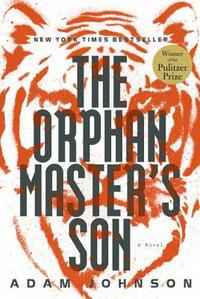Take a photo of a barcode or cover
i don't think i can keep reading this one. i'm half way through and it's just not for me. the characters aren't interesting. the plot is too thick. everything about it is just too novel-y for my mind. plus, since no one in the 'book club' has even picked it up i'm not feeling too bad about not even finishing it. quickest end to a book club ever ;-)
This tale is deeply disturbing but ultimately one of the best depictions of trauma that I've ever had the pleasure to read. A literary masterpiece.
I first heard of this book last year, when I saw Adam Johnson at the National Book Festival. He was an engaging speaker, and I immediately put the book on my list to read. I've since watched several interviews with the author, and am always struck by how soft spoken he is and how gently he portrays the horrors he found in his researches for this book.
There are two passages in the book that struck me. One was from the first part of the novel itself, the other from the interview with the author at the back of the book.
The first was this: "The hallway was lined with photographs of the Senator's family, always smiling. To move toward the kitchen was like going back in time, the graduation photos becoming sports photos, and then there were scouting clubs, pigtails, birthday parties, and finally the pictures were of babies. Was this what a family was, how it grew--straight as the children's teeth? Sure, there was an arm in a sling and over time the grandparents disappeared from the photos. The occasions changed, as did the dogs. But this was a family, start to finish, without wars or famines, or political prisons, without a stranger coming to town to drown your daughter." It is a beautifully written passage about how foreign a normal family would seem to someone completely unfamiliar with it.
There were many passages throughout the novel that moved me, certainly too many to quote here, but what took it from four stars to five for me was this at the end of the author interview: "Trauma narratives are hallmarked by fragmentation, broken chronology, changing perspectives, shifts in tone, and absented moments. I needed to capture those elements if I was to conduct a true outlet for the experiences of these characters. And North Korea, I believe, is a trauma narrative on a national scale. The real mistake would have been to force this story into a shape that conformed to a Western reader's expectations--you know, a nice beginning-middle-end kind of thing. The reality is that we'll know the true way to write a novel set in North Korea when North Korean novelists become free to tell their own stories. I hope that day comes soon."
Amen.
There are two passages in the book that struck me. One was from the first part of the novel itself, the other from the interview with the author at the back of the book.
The first was this: "The hallway was lined with photographs of the Senator's family, always smiling. To move toward the kitchen was like going back in time, the graduation photos becoming sports photos, and then there were scouting clubs, pigtails, birthday parties, and finally the pictures were of babies. Was this what a family was, how it grew--straight as the children's teeth? Sure, there was an arm in a sling and over time the grandparents disappeared from the photos. The occasions changed, as did the dogs. But this was a family, start to finish, without wars or famines, or political prisons, without a stranger coming to town to drown your daughter." It is a beautifully written passage about how foreign a normal family would seem to someone completely unfamiliar with it.
There were many passages throughout the novel that moved me, certainly too many to quote here, but what took it from four stars to five for me was this at the end of the author interview: "Trauma narratives are hallmarked by fragmentation, broken chronology, changing perspectives, shifts in tone, and absented moments. I needed to capture those elements if I was to conduct a true outlet for the experiences of these characters. And North Korea, I believe, is a trauma narrative on a national scale. The real mistake would have been to force this story into a shape that conformed to a Western reader's expectations--you know, a nice beginning-middle-end kind of thing. The reality is that we'll know the true way to write a novel set in North Korea when North Korean novelists become free to tell their own stories. I hope that day comes soon."
Amen.
I really liked this book. I thought the first third was really slow, but I really felt for all the characters of the book. All of the North Korea stuff was fascinating and the tiny moments of beauty really shined through.
Whew! It took me a whole week to get through this one. I found it a really interesting read when I was able to pay attention, but I found it easy to be distracted. Although fiction, it's steeped in enough research to have an authenticity not always present in novels. Anyone with an interest in North Korea would probably enjoy this novel. It cleverly messes with your mind and makes you grateful for your "imperial" existence at the same time.
I really do not know how to rate this book. I'm rating it high, because the writing is good--the plot sucked me in and is very interesting. And the (fictional, but apparently well-researched) description of life in North Korea is just fascinating. BUT. The amount of and graphic detail of torture is unrelenting. By the end I was fascinated to find out what happened, and desperate for it to end.
adventurous
challenging
dark
emotional
funny
informative
mysterious
reflective
sad
tense
fast-paced
Plot or Character Driven:
A mix
Strong character development:
Yes
Loveable characters:
Complicated
Diverse cast of characters:
Yes
Flaws of characters a main focus:
Yes




